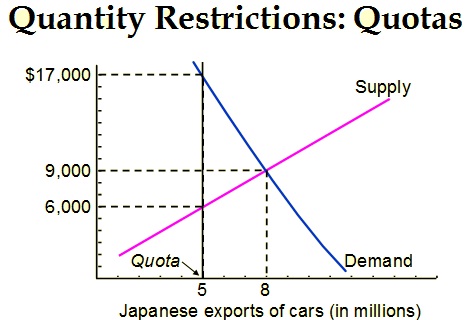Discussion Question:
In 1981 the US Government threatened to impose quotas on the importation of Japanese autos. The Japanese agreed to limit imports voluntarily, which in effect was a quota. You may answer all or select any of the following.
Using the graph attached:
Question 1. What would you expect to happen to the price of Japanese cars if the quantity imported was limited? (What price is equilibrium), (What is the quantity demanded at $9,000; $17,000)
Question 2. What would you expect to happen to the price of American cars if the quantity of Japanese autos were limited? Would the prices rise, fall, unchanged? Why?
Question 3. If you were a U S auto manufacturer would you be in favor of such quotas and why? Did the strategy work?
Question 4. If you were a consumer would you be in favor and why? Have car prices declined since the early 1980's.
Question 5. If you were a member of the UAW (look this up if you don't know who this is) would you be in favor and why? What happened to the number of union members since the imposition of these 'voluntary' quotas
Use the chart below to help you with your response. The chart is attached because OLS will not let me paste it into the question.
These discussions were taking place in 1981, the US auto industry was in deep trouble; the economic principles were well know at the time. It appears that economics has triumphed over politics as the US auto industry as continued to face the same problems they had in 1981. The average price of EVERY auto sold in the US both foreign and domestic has risen by approximately $3,500 because of the restrictions. Recently it has been announced that Toyota is the second largest auto manufacturer in the world 22 years after this temporary relief has gone into effect.
